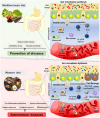Unraveling the intricate dance of the Mediterranean diet and gut microbiota in autoimmune resilience
- PMID: 38818135
- PMCID: PMC11137302
- DOI: 10.3389/fnut.2024.1383040
Unraveling the intricate dance of the Mediterranean diet and gut microbiota in autoimmune resilience
Abstract
The nutritional habits regulate the gut microbiota and increase risk of an autoimmune disease. Western diet is rich in sugars, meat, and poly-unsaturated fatty acids, which lead to dysbiosis of intestinal microbiota, disruption of gut epithelial barrier and chronic mucosal inflammation. In contrast, the Mediterranean Diet (MedDiet) is abundant in ω3 fatty acids, fruits, and vegetables, possessing anti-inflammatory properties that contribute to the restoration of gut eubiosis. Numerous studies have extensively examined the impact of MedDiet and its components on both health and various disease states. Additionally, specific investigations have explored the correlation between MedDiet, microbiota, and the risk of autoimmune diseases. Furthermore, the MedDiet has been linked to a reduced risk of cardiovascular diseases, playing a pivotal role in lowering mortality rates among individuals with autoimmune diseases and comorbidities. The aim of the present review is to specifically highlight current knowledge regarding possible interactions of MedDiet with the patterns of intestinal microbiota focusing on autoimmunity and a blueprint through dietary modulations for the prevention and management of disease's activity and progression.
Keywords: Mediterranean diet; autoimmune diseases; autoimmunity; dysbiosis; microbiome.
Copyright © 2024 Tsigalou, Tsolou, Stavropoulou, Konstantinidis, Zafiriou, Dardiotis, Tsirogianni and Bogdanos.
Conflict of interest statement
The authors declare that the research was conducted in the absence of any commercial or financial relationships that could be construed as a potential conflict of interest. The author(s) declared that they were an editorial board member of Frontiers, at the time of submission. This had no impact on the peer review process and the final decision.
Figures
Similar articles
-
Impact of fundamental components of the Mediterranean diet on the microbiota composition in blood pressure regulation.J Transl Med. 2024 May 3;22(1):417. doi: 10.1186/s12967-024-05175-x. J Transl Med. 2024. PMID: 38702795 Free PMC article. Review.
-
The diet rapidly and differentially affects the gut microbiota and host lipid mediators in a healthy population.Microbiome. 2023 Feb 11;11(1):26. doi: 10.1186/s40168-023-01469-2. Microbiome. 2023. PMID: 36774515 Free PMC article.
-
TASTY trial: protocol for a study on the triad of nutrition, intestinal microbiota and rheumatoid arthritis.Nutr J. 2025 Apr 7;24(1):52. doi: 10.1186/s12937-025-01089-6. Nutr J. 2025. PMID: 40189532 Free PMC article.
-
Gut Microbiota and Type 1 Diabetes Mellitus: The Effect of Mediterranean Diet.Front Nutr. 2021 Jan 13;7:612773. doi: 10.3389/fnut.2020.612773. eCollection 2020. Front Nutr. 2021. PMID: 33521039 Free PMC article. Review.
-
Towards a Food Pharmacy: Immunologic Modulation through Diet.Nutrients. 2019 May 31;11(6):1239. doi: 10.3390/nu11061239. Nutrients. 2019. PMID: 31159179 Free PMC article. Review.
Cited by
-
Beyond the Skin: Exploring the Gut-Skin Axis in Chronic Spontaneous Urticaria and Other Inflammatory Skin Diseases.Biomedicines. 2025 Aug 19;13(8):2014. doi: 10.3390/biomedicines13082014. Biomedicines. 2025. PMID: 40868265 Free PMC article. Review.
References
-
- Senghor B, Sokhna C, Ruimy R, Lagier J-C. Gut microbiota diversity according to dietary habits and geographical provenance. Hum Microbiome J. (2018) 7-8:1–9. doi: 10.1016/j.humic.2018.01.001 - DOI
Publication types
LinkOut - more resources
Full Text Sources
Miscellaneous


